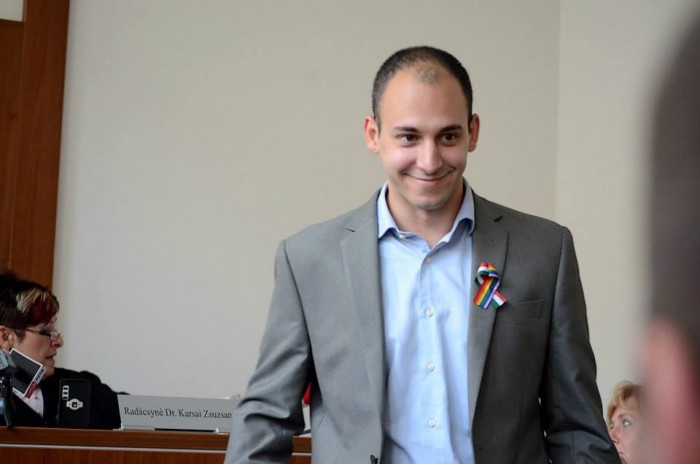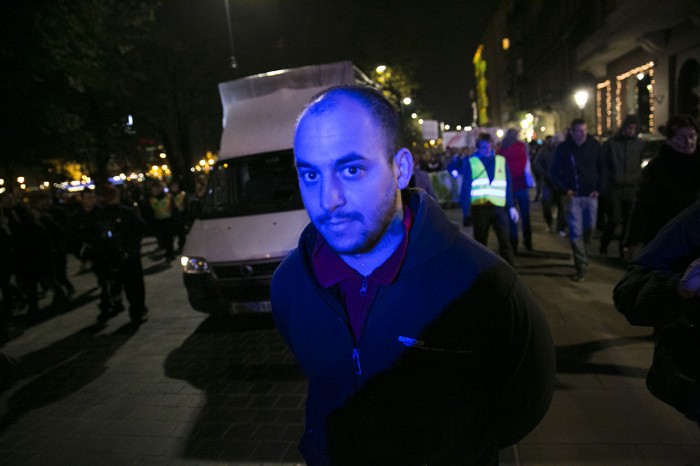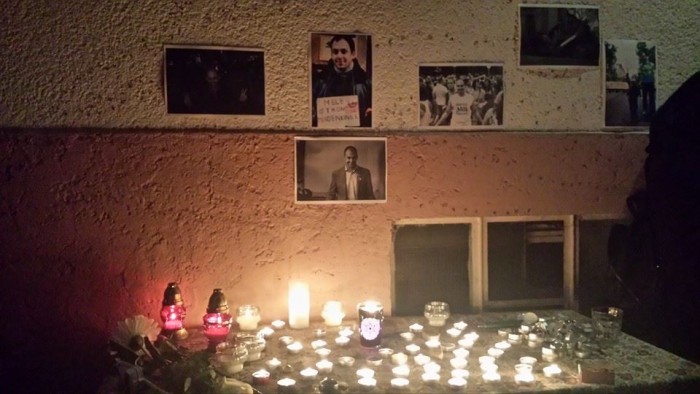Milán Rózsa was born just a year before the fall of the Berlin Wall, in 1988. He had no personal experience fighting for rights and freedoms, something that an earlier generation of young Hungarians had engaged in, during the last years of the Kádár regime. Yet over the past four years, Mr. Rózsa became one of the most prominent and certainly the most outspoken (and possibly among the most energetic) young activists of the left. During the Internet tax protests, Mr. Rózsa played a key role and was present among the demonstrators at Fidesz party headquarters. He was arrested, but not charged. Earlier, he trespassed on the property of Russia’s embassy in Budapest, to protest homophobia and support gay rights for Russia’s LGBT community. He also made headlines by climbing up on the balcony of Hungary’s presidential palace, the Sándor palota, demanding a referendum on whether Hungary should accept Russian financing of the Paks atomic energy plant.
But on Friday, Mr. Rózsa made headlines for a different reason: at age 26, he committed suicide by jumping in front of a train. Stuart Milk, who had written about Mr. Rózsa earlier on for The Huffington Post, wrote one of the most eloquent farewells on his Facebook profile.
“Milán Rózsa is a hero that we all lost today. This is so very hard to write. One of the great rewards of doing global face to face advocacy is becoming close friends with extraordinary human souls doing incredible work in the harshest of environments. One of the worst elements of doing this on the ground global work is losing so many of these amazing friends. Anyone who has heard me speak on global rights in the last few years know that Milán had allowed me to publicly tell his inspiring story,” wrote Mr. Milk, an LGBT activist and nephew of Harvey Milk, a San Francisco-based municipal politician and staunch LGBT rights activist, who was assassinated in 1978.
Stuart Milk likened Mr. Rózsa to his late uncle, Harvey, when his foundation made it possible for the Hungarian activist to visit and speak about his struggle in Washington, DC. Mr. Rózsa led the LGBT Pride Parade in Budapest in 2011, when it was attacked by young fascists and and neo-Nazis. Mr. Milk had been in attendance as well. “The state-sanctioned hostility, hate and violence directed at the LGBT community and other minority communities in Hungary are worse than we could imagine here across the Atlantic,” wrote Mr. Milk.
Mr. Rózsa showed remarkable bravery when faced with violent far-right activists, but his father saw his son’s public stance differently, and committed suicide a day after the parade. “Milan was shocked, weary, bruised to the bone and deeply depressed, but his courage would remain strong in the face of adversity,” observed Mr. Milk.
Mr. Milk promised the young Hungarian activist, that he could count on the moral support of key American leaders, who view with consternation political events unfolding in Eastern Europe.
“He will know that he does indeed have the support of our nation, which, though separated from him by an ocean, understands that we live in an increasingly global society and that we will not stand silently by when hate and repression rear their ugly heads anywhere. As my uncle Harvey said, “Hope will never be silent.” Milán is a reminder of that mantra. He is a reminder that the price of equality is vigilance” wrote Mr. Milk.
Mr. Rózsa’s shocking and tragic death late this week truly rattled the thousands of other activists who knew this 26 year old young man personally. Some wondered whether, indeeed, he had committed suicide. His close friends seem certain that he had in fact taken his own life, and added that Mr. Rózsa had been struggling with depression for some time.
He had been so determined to continue fighting for equality and democratic rights, even just a couple of weeks ago, that even his closest allies didn’t grasp the personal pain that he was going through. This is a stark reminder that people (especially men) often struggle with mental illness in silence, due to the societal stigma.
In addition to the thousands of tributes on social media sites, Mr. Rózsa’s supporters lit votive candles and left photographs in front of the building where he lived. The Hungarian democratic opposition lost one of its most credible, courageous and dynamic voices.


